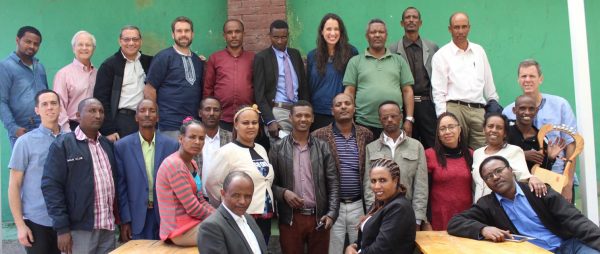Here we are currently in Ethiopia. As I look around. I’m astounded that most of these leaders have been persecuted for this faith, some imprisoned and tortured. I am humbled that we can walk alongside them in their development, for we have a lot to learn from these incredible men and women. These past two weeks we have been teaching on Spiritual Leadership and Leading Teams to these participants. When we leave from this place I will return with our team to the States where we’ll celebrate Christmas in safety with our loved ones. When these leaders depart from this gathering they will face injustice, and will dare to be lights in dark places. But they will thrive because they go in the strong name of Christ. We have a lot to learn from them. In six months they will: come back for our next visit to Ethiopia. return to be with us because they truly want to learn and dialogue together as a group about how Christ-centered leadership can be played out in their specific contexts. report the way that God has changed them in their leadership, thus changing their churches. share about the times they have messed up as leaders and will receive the grace that Jesus freely offers. And we will have their names on our lips as we leave from here and will remember to bring them before the Father. I don’t say these things because I’m depending on this great program we call The Garden Project. This
Read moreOn the night before His crucifixion, Jesus said to His disciples, “If you remain in me, and I in you, you will bear much fruit.” These disciples did remain in Christ, and God used them beyond their wildest imagination. What is happening in this church?
Read moreAs we are at the end our series, two questions are asked:
- We’ve been looking at all of these streams as integrated with each other. We have said that healthy spiritual leadership is more likely when leaders set out to make ALL these streams an integral part of their lives and leadership. If integration is our goal, what happens if any one of these streams is practiced in isolation from any of the other streams? In other words, what are potential weaknesses of the Compassionate Life stream, for example, if practiced in isolation from the New Life, Abiding Life, and Empowered Life?
- So, what? Why does all this matter? What does all this really mean for me as a leader?
Their names were Carpus and Papylus. And they demonstrated the Witnessing Life.
In A.D. 165, Carpus and Papylus were brought before a governor in Rome and charged with the “crime” of being Christian. The governor of the district had discovered that Carpus and Papylus did not celebrate the pagan festivals. He ordered the men to be arrested and commanded them to accept the Roman pagan religion. The men replied that they would never worship false gods.
Carpus, who was a leader in the church. Not even torture could persuade him to change his mind. He simply kept repeating, “I am a Christian and because of my faith and the name of our Lord Jesus Christ I cannot become one of you.”
Papylus was a wealthy man with many children. Papylus said, “I have served God since my youth, I have never sacrificed to idols. I am a Christian. You cannot learn anything else from me. There is nothing I can say which is greater or more wonderful than this.”
Both Carpus and Papylus were burned alive.
Read moreWhat about terrorists? Yesterday we were challenged to look at The Compassionate Life a little closer. In the attempt to write a modern day parable similar to The Good Samaritan, we look at different kinds of people that cross our paths every day. I believe God brings certain people across our path for a reason, but sometimes we have to go TO them. As we think of these people, though, we ask ourselves the hard question: “what type of person is the hardest for me to extend compassion to?” And what does exactly does it mean to live the Compassionate Life?
Read moreThere is an ailment that is infecting many well-intentioned Christian people around the world, including myself. These people are good people. They are generous people. And they are sacrificial people. But this disease is infecting them.
Read morePeople know this pictured spiritual leader as A.B. Simpson, especially those who associate themselves with a Christian denomination called the Christian & Missionary Alliance. But, before that he was simply a young man named Albert. And Albert was one who exemplified The Empowered Life.
Read moreYesterday we started examining The Empowered Life. We acknowledge that we are tired of living this upright kind of life and that we have come to the end of ourselves. We say with our mouths that we believe in the power of the Holy Spirit, but how much do we really hold that to be real? The fact is, Jesus – through the sanctifying Spirit – is able to do for us what we cannot do for ourselves. Not only that, He can empower us to do great things for the Kingdom, much as he did at Pentecost for a group of ordinary disciples. But this can happen nothing short of an encounter with the Supernatural.
Read moreIs anyone tired? Not the kind of tired that comes from staying up late last night or from having a busy week at work. I’m talking about the kind of tired that is bone-weary, the kind of tired that says, “I’m ready for the next world. Jesus, take me home now.” Do you feel that you are sludging along in a field of molasses, weary in this struggle of just trying to live life, let alone an “upright” life? The kind of tired that no amount of exercise or eating right or developing good habits or other people can solve? I know I experience that. Every single day. Not hopelessness, just resignation. We’ve heard it sung from the church risers and we’ve heard it shouted from the pulpit: Jesus, through the empowering, sanctifying Holy Spirit, is able to do for us what we are not able to do for ourselves. He is able to empower us when we come to the end of ourselves. We know that in our heads and say it with our lips, but how well do we embrace that in our hearts?
Read moreThe last few days we’ve been talking about the New Life. Yesterday we heard John’s story. Now we’re moving on to the second stream of Spiritual Leadership: the Abiding Life. What exactly do we mean when we talk about the Abiding Life? Basically our main idea is this: Both the receiving of the sacraments (baptism and communion) and human intuition can be means by which believers experience intimacy with God; however, both sacrament and intuition can potentially lead to idolatry. Neither is a guarantor of being a disciple of Jesus Christ. Ultimately God is the initiator, and we are respondents, not the other way around. We are in this journey of an abiding life with God.
Read moreI’d like to introduce you to John. I’ve never met John personally, though I have benefitted from his influence. Perhaps his story will influence you as well. John’s life is a great example of one who embraced the New Life in Christ. This New Life was not something that was not just born overnight, but, rather, involved a complicated journey. This journey that spanned several decades brought him to the place of being able to touch many people through the gift of music.
Read moreThis is part of a blog series on Spiritual Leadership. October 15, 1974. As an elementary student I went to the Good News Club after school, and through the story of the Wordless Book, I prayed and invited Jesus into my heart. Today I celebrate 40 years of being a follower of Jesus. July 27, 1972. I was a teenager on a destructive path. On this day Jesus radically changed my life. April 6, 2000. I was a college student that thought he knew everything. I was a philosophy major, after all. But then someone shared Jesus with me and I surrendered my life to the One who is THE way, the truth, and the life. My life would never be the same after this day. Like these situations above, how many of you have a specific date that you mark on your calendars that draws the line in the sand from when you crossed from your old life to your new life in Christ? On the other hand, how many of you are like me? That is, you can’t really pinpoint an exact date but you know in your heart of hearts that you’ve embraced Jesus as your Lord and Savior?
Read moreSpiritual Leadership Tell me, what is the first thing that comes to mind when you think of spiritual growth or discipleship? A solitary individual meditating or praying? People who are always ready to tell others about who God is and what He has done? The woman who reaches out to her neighbors in their time of need? People gathered together doing service on behalf of their church? Healings, miracles, and speaking in tongues? Administering the sacraments? When we talk about Spiritual Leadership we talk about something that addresses both the leader’s personal spiritual development as well as his or her role in the spiritual development of others. Those “streams” we’ve been talking about are different images of what a healthy spiritual life looks like. They also give definition to Jesus’ command to “make disciples,” the emphasis being to lead others to “Follow me, as I follow Christ.”
Read moreThe Old Testament is rich with stories about a God who chooses a people for Himself and pursues relationship with them. Intertwined in these stories is the promise of an Anointed One who would come and make all things new, both for the present age and the age to come. There is about a 400-year gap between the Old Testament and the New Testament. In that gap there seems to be silence, but we have to wonder if there wasn’t a certain anticipation. We have to wonder if within those pages of history in the in-between, as the Israelites were rebuilding their lives again following a time of a captivity and exile, they weren’t also solidifying their faith, holding that promise closely.
Read moreSpiritual Leadership This post is part of a series on Spiritual Leadership. When FTL went into South Asia for the first time in 2010 we knew we were committing to a specific group of church and ministry leaders for the long haul. And they were committing to us. Although our initial commitment was a four-year program that would feature eight leadership development modules and one-on-one mentoring, we really didn’t know just how much God would stretch and mold and use us for His purposes. We heard the calling and had the vision. We even had what we thought was a clear strategy for Phase 1 of this ministry. We set out to make a dent on the world. But I don’t think any of us really expected the impact it would have, both on our lives personally and in the way we look at Christ-centered leadership.
Read more










